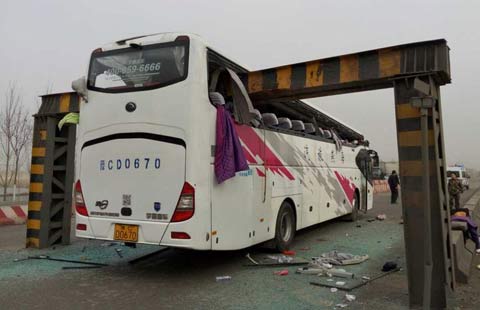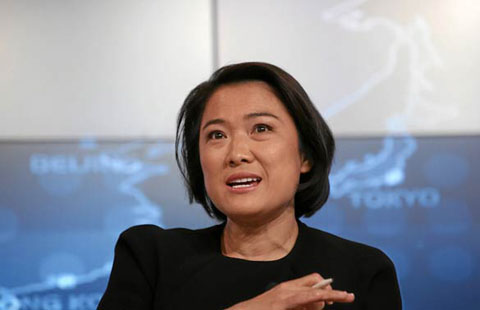Obama's India trip triggers triangular concern
Updated: 2015-01-27 09:35
By CHEN WEIHUA in Washington(China Daily USA)
|
||||||||
As US President Barack Obama visited India over the last three days to attend its Republic Day festivities, the triangular relationship between China, US and India has aroused much speculation.
On Monday in Beijing, Chinese Foreign Ministry spokeswoman Hua Chunying said China hopes that the development of US-India relations will help promote mutual trust and cooperation among countries in the region, and safeguard peace, stability and prosperity of the region as well.
Her words came as both Chinese President Xi Jinping and Chinese Premier Li Keqiang sent congratulatory messages on the occasion of the 66th India Republic Day to their Indian counterparts, President Pranab Mukherjee and Prime Minister Narendra Modi. Xi and Li pledged that China is willing to work with India to deepen their mutually beneficial cooperation, build closer partnership in development and elevate the bilateral strategic cooperation partnership to a higher level.
Xi made a landmark visit to India last September when the two largest and most populous developing countries agreed to further cooperation in a wide range of areas.
Despite news media hype of a lingering border dispute between China and India, China became India's largest trading partner for the first time last year, edging the United Arab Emirates, which dropped to the third place, trailing the US.
In New Delhi on Monday, US Deputy National Security Advisor Ben Rhodes dismissed the concern that the US and India are joining hands against China.
"…I think the way in which the United States and India approach the issue in the Asia Pacific is very similar in the sense that nobody is aiming for confrontation with China or even to contain China," he told reporters on Tuesday.
"Both the United States and India have very close relations with China in many different fields," Rhodes said.
He then added that the US and India are committed to a rules-based order in the world, clearly implying US criticism of China's behavior in the South and East China seas, cyber space and trade areas.
Similar views were also expressed by US Assistant Secretary for East Asian and Pacific Affairs Daniel Russel when talking to reporters in Bangkok, Thailand, on Tuesday.
Many in China have regarded the US as biased in favor of its treaty allies, especially Japan and the Philippines, in their maritime territorial disputes with China, including Japan's dramatic move to nationalize the Diaoyu Islands in late 2012, which caused the fresh tensions between the two East Asian neighbors. Despite tensions, China and Japan are also each other's major trade partners.
Many people both inside and outside of China are deeply suspicious that under the so-called pivot to Asia Pacific policy, the US has been trying to rally its allies against China, a country that follows a foreign policy of no alliance.
In a comment on the US-India relationship and China for Obama's trip to India, Tanvi Madan, a foreign policy program fellow at the Brookings Institution, described India and US relationships with China as both having elements of cooperation, competition and, potentially, conflict, though in different degrees.
"Each thinks a good relationship with the other sends a signal to China, but neither wants to provoke Beijing or be forced to choose between the other and China," Madan said of the US-India relationship in her comment posted on the Brookings website.
Writing in China Daily on Monday, Swaran Singh, a professor at School of International Studies at Jawaharlal Nehru University, said although India's DNA will never allow it to become a close ally of the US and its leadership can never be imprudent enough to adopt a policy of containing China, there is no doubt that China's continuous rise has become a matter of concern for New Delhi.
"Modi must realize that since the Chinese economy has increased from 2.5 times that of India in 2000 to five times today, he has to focus on economic diplomacy and build partnerships with one and all to replicate China's policies," Singh wrote.
He believes that Modi sees no contradiction in pursuing friendly ties with both the US and China.
Modi, when he was chief minister of Gujarat, had visited China multiple times to seek closer ties with the rapidly growing neighbor country.
Both China and India are members of the BRICS nations, which also include the emerging economies of Brazil, Russia and South Africa. The newly announced BRICS bank, now known as New Development Bank, will be based in Shanghai and with its first president coming from India.
"Calibrating various competing interests and balancing various competing domestic constituencies calls for bold initiatives at home and diplomatic finesse in foreign policy. And it is the duty of India's partners, including China, to ensure that their mutual trust-deficit is not allowed to derail their expanding partnerships," Singh wrote.
chenweihua@chinadailyusa.com

 Northeastern US braces for 'crippling' blizzard
Northeastern US braces for 'crippling' blizzard
 At least 2 dead, dozens hurt after bus hits road barrier
At least 2 dead, dozens hurt after bus hits road barrier
 Red carpet of 21st annual SAG Awards in Los Angeles
Red carpet of 21st annual SAG Awards in Los Angeles
 New Year celebrated with dance mix
New Year celebrated with dance mix
 Businesswomen shine at the World Economic Forum
Businesswomen shine at the World Economic Forum
 Dogs compete at the Siberean Cup
Dogs compete at the Siberean Cup
 The world in photos: Jan 19-25
The world in photos: Jan 19-25
 Drama with a twist
Drama with a twist
Most Viewed
Editor's Picks

|

|

|

|

|

|
Today's Top News
10 million new jobs on way in China, Li vows
High abortion rate triggers fears for young women
Small drone crashes on White House
Clients urged to be wary as deposits vanish
China's GDP growth forecast at 6.8%
Favorable visa policy to draw talent
Chinese rank US No 1 road trip destination
Expert: What Obama's India visit means to China
US Weekly

|

|







